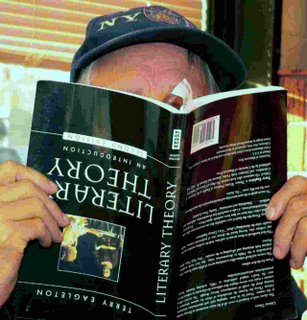A Good Online 2006 Christmas: Keeping Internet Buying On Billboards All Year Long | | Guardian Unlimited Business
Bloggers, of anyone on the planet, know that for the Internet it is now more than the interface, it is distributed and virtual software: Web 2.0/3.0 that will be hot in tech news (again).
But with wireless and cellular or satellite comm expanding, there is all the more reason to push shoppers online "instantly" in 2007. This Internet access mobility, for transmiting ads AND closing the sale, will push 'impulse buying'. The scenario Blogaulaire sees coming could be very strange; almost as strange as car-hops on rollerskates were in the mid-to-late 1950s.
More advertising dollars are certain to go toward instant shopping, without even looking at the screen. Using any iThis or iThat - any of a myriad of handheld devices now closer than the horizon - Internet shopping could be as easy and without customer care as picking up a latte to go.
(Using a handheld as a price scanning and price-comparing device via satellite downloads of web searching will figure as only the most arcane of utilities. Punching in a short code on a device for instant purchase may become the most mundane application.)
In an earlier post, Blogaulaire posed the query: Is it all so 'the Establishment' now that it is boring. That's an acceptable question. But I also implied that the quality and service issues with online marketers would, in a manner of putting it, vanish. Cuz that's boring too!
Well people are people, and we have the opportunity to look back over nearly 3 weeks of 2007. And I have to make one revision. It looks like the issues of bait 'n' switch, like motel owners were accused of going back to the invention of the automobile (and used car salesmen thereafter), well those consumer protection issues, I predict, are going to stick it out in the LIVING and BUSINESS as well as ENTERTAINMENT sections of the print newspapers.
Maybe we'll see more of this:
Business News
Amazon mystery: pricing of books
A Times reporter finds fluctuating costs for his obscure chosen titles at the Internet retailer.By David Streitfeld,
Times Staff WriterJanuary 2, 2007After getting 'burned' at Amazon for a title that he selected online but only decided to buy a few days later, a writer for the
L. A. Times decided to do his own fantom shopper test.
David Streitfeld would add items to his basket while on
Amazon and note the prices; then he would come back a few days later to 'check out' and pay. In this test, both the
U.S. Amazon site and the
U.K. Amazon site registered
more price rises than
declines for the items in Streitfeld's pre-Christmas basket.
Streitfeld was acting out the role of a buyer so rushed that first he skims through tossing stuff in a basket. Only later, after the rush of desire does he 'check out' to pay with his plastic number account. But most people in such a rush would not take the final step he took: compare initial price with check-out billing.
Instead of just name-calling, labelling the phenomenon "price gouging", the
L. A. Times reporter went out and interviewed someone with expertise in the field of marketing practises:
"
Sucharita Mulpuru, an e-commerce analyst at
Forrester Research Inc., wondered whether Amazon was going down the path of dynamic pricing.
Dynamic pricing involves selling identical material for different amounts based on the customer's willingness to pay. In the physical world it's a common feature. Want to fly to Paris tomorrow? It's going to cost lots more than if you can wait a few weeks."
This feature business article, in a final
understatement, says such business practises may be 'normal' but,
"There's also the risk of alienating customers." Good point. Do we risk being further alienated all year long?
Will it be "Hold the steering wheel hon, I want to order '
that'," pointing to the passing billboard as the car swerves into the left lane and the driver pulls out a cellphone.















